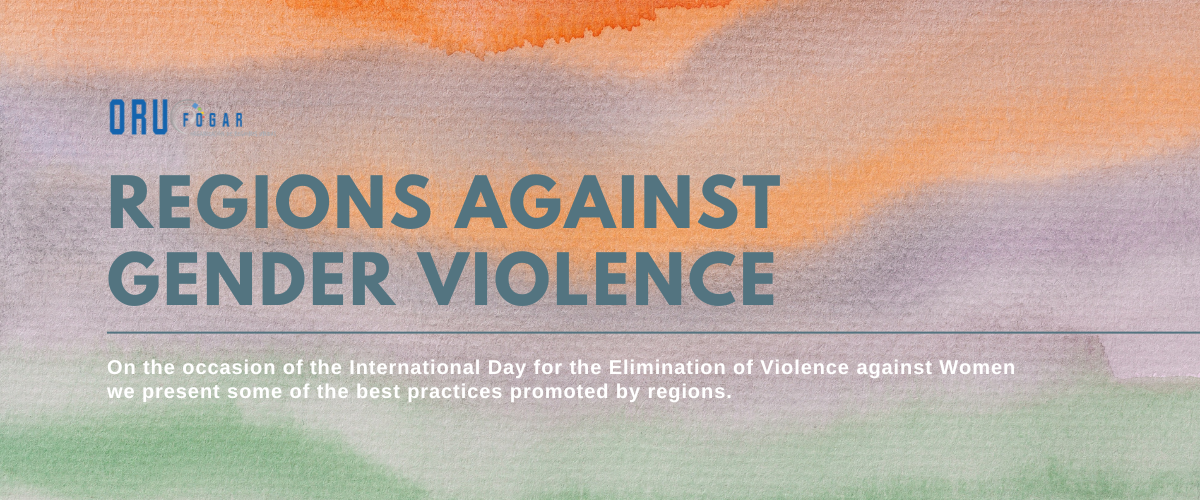Regions against gender violence

On the occasion of the International Day for the Elimination of Violence against Women, we present some of the best practices promoted by regions.
After several decades in which progress towards gender equality seemed unstoppable, for some time now, we see a high level of violence against women emerging in many spaces. It is a violence that comes from something very ancient, but that is completely contemporary -for example- when it takes the form of 'Sextortion' through the networks.
In almost all countries, legislation has come a long way in favor of equality. The participation of women in the political process improves election after election, in almost all continents, although at the regional level (it must be said) it does so very slowly. Women, all over the world, are occupying the classrooms of the best schools and universities. And the number of female teachers continues to grow, having a very positive effect on the confidence of girls, while at the same time helping to reduce discrimination and implicit or explicit gender violence in the school system.
All these advances occur in the institutional sphere, in developed and welfare contexts. Throughout the world there is, however, another side of the coin where countless women of all ages and conditions continue to be victims. These are situations that regional governments know very well, because they face them on a daily basis. It is no longer, and only, the fatal victims of gender violence. Nor the systematic and unstoppable femicide of some territories. It is also about gang rapes that, like a plague, have proliferated in an incredible way in different geographies. Sexual trafficking and the sale of girls, which is increasing in regions where the law and the force of the state do not count. And also of the sexual abuse that roams through immense territories in which, for now, the MeToo neither arrives, nor is it expected.
With the arrival of COVID-19 many things got worse. The lockdowns aggravated domestic violence, locking up the victim with the abuser. Many girls and women faced sexual demands in exchange for rent, land or public housing, a fair trial or a work permit. Bribes for 'sextortion' multiplied. And all this occurs in an invisible and silent way. Nobody dares to speak. No one is able to report the situation. Many women fear losing their jobs or suffering reprisals if they report the situation, when they are not afraid of being discriminated against for acts that embarrass them, when they should only embarrass their aggressors. Situations that are aggravated the greater the marginality of the context and that is especially serious in spaces where racial discrimination is combined with sexual discrimination. Many women of color are very propitious victims of all these situations.
How are all these situations addressed? It is evident that there is a legislative sphere that is responsible for promoting central governments. It is no longer enough for the law to speak of guaranteeing equality. In the face of violence, the laws must now guarantee the confidentiality of complaints and must provide protection against reprisals. Nor is the current classification of sexual crimes sufficient. It is necessary to punish bribery and extortion that take advantage of situations of power, especially in the official sphere. The 'Sextortion' must have its penalty. And reparation for victims and survivors must be guaranteed.
In turn, regional governments must design and implement -and they are doing so- public policies with a gender perspective that combat violence and discrimination. These governments with a human dimension, first of all, must help to break the silence, paying attention to problems that are often overlooked. It must be made visible that there are victims. It must be done with civil society and the complicity of women's associations. In women-led committees, women are more likely to expose corruption, identify common problems and solutions, and enable collaborative research and advocacy.
Regional governments, following the recommendations of UN Women, incorporated the gender perspective in their response to the COVID-19 pandemic. Thus, they were dedicating additional resources to address the increased risk of domestic violence during this situation and to the economic empowerment of women, as part of the socioeconomic recovery plans. Above all, centers were set up that provided free and confidential legal advice to witnesses and victims of violence, allowing people to report corruption safely.
Some good practices to highlight
Scotland
The Scottish Government has always paid close attention to women's rights. Last year, for example, her parliament approved a plan to provide free menstrual hygiene products to all women. Thus, Scottish women have achieved something, for the first time in the world, that has historical significance. In a seminar against gender violence it is worth presenting the video "Don't be that guy". This video, released in November and immediately going viral, called on men to change their attitudes and behaviors to prevent crimes of sexual violence. Thus, he explains: “Most men do not look in the mirror and see a problem. Sexual violence starts much earlier than you think. Don't be this guy." In it, various men describe actions that are often passed off as insignificant but that women may find threatening or intimidating. The recording has been broadcast on all social networks and leads to a website full of information on how men can help combat male violence against women.
The video: https://www.youtube.com/watch?v=wf-rOrOXoRI
The campaign:
Shenzhen, China
The Chinese province of Shenzhen has published a manual on the prevention of sexual harassment, setting a good example of how to practically apply anti-harassment laws. The manual specifies for the first time the three elements that constitute sexual harassment: first, it is against the subjective will of the victim and is not welcomed by her; second, it is a violation of the rights of the person; and third, it causes adverse psychological feelings or a hostile work or study environment for the victim. It also specifies the types of words, text, images, and physical acts that could constitute harassment. The manual is mainly intended for institutions, companies and schools. Thus, it requires them to establish special supervision departments, formulate work regulations, conduct training, and handle complaints and reports.
Information: https://global.chinadaily.com.cn/a/202103/30/WS6062782ca31024ad0bab264c.html
Rio de Janeiro, Brazil
Cases of violence against women constitute the main demand for emergency care by the Military Police of the State of Rio de Janeiro, corresponding to a third of these calls in the Metropolitan Region of Rio de Janeiro. In response to this problem, the state police institutions have invested in a specialized police model called: "Patrulla Maria da Penha", focused mainly on assisting women victims of violence. The highlight of the program is the perspective of an integrated and articulated action with all the organs of the justice system, the network of support and assistance to women in situations of violence, as well as civil society, through organizations dedicated to the subject. . In this sense, the program is supported by external collaborations, in addition to having a formal Protocol of Intentions signed with the Court of Justice of the State of Rio de Janeiro, which establishes objectives and commitments for both parties. Among the general objectives are the effective and socially recognized action of the State Police in the fight against gender violence, the preservation of life, acting in a qualified manner in the prevention of violence against women, especially femicide.
In 2021, this project deserved one of the awards of the VI Regional Best Practices Award from ORU Fogar and UNDP.
The video: https://www.youtube.com/watch?v=NKlW1lVHWME
Región San Martín, Perú
The Regional Government of San Martín, an Amazonian region that is currently considered a source, transit and destination area for trafficking in children, adolescents, women and men, approved last year a Regional Plan against Trafficking in Persons. The document includes specific actions both for the prosecution of traffickers and for the protection of the victim. Already in 2016, a study by the NGO Capital Humano y Social Alternativo indicated that San Martín was one of the main regions for capturing victims, for the purpose of labor or sexual exploitation, whose final destination was the capital of the country, Lima, and other large coastal cities. According to the Public Ministry, 79% of the victims are women. According to the statistics, of these, 79% are under 18 years old, 17% are between 18 and 25 years old and the remaining 4% are older.
Information: https://regionsanmartin.gob.pe/Noticias?url=noticia&id=5692
Basque Country
The Basque Country today is a benchmark in the development of policies for equality and the prevention and elimination of violence against women. In 2022, the Basque Parliament approved a comprehensive reform of Law 4/2005 for the Equality of Women and Men, in order to adapt it to the social and regulatory changes that have occurred since its approval, in particular the Convention on the prevention and fight against violence against women. women and domestic violence (better known as the Istanbul Convention), adopted by the Council of Europe in 2011.
To reform the law, -Emakunde-Basque Institute for Women, has led a process in which it has tried to collect and bring together the greatest number of opinions and visions in order to achieve the greatest possible consensus so that this is a law of all of Basque society and for all of Basque society.
More information:
https://www.youtube.com/watch?v=wQUoMRxDDJ0










































































